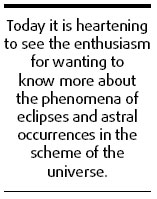Solar spectacle
Both excitement and disappointment were writ large on millions of Chinese faces gazing at the sky for a glimpse of the solar eclipse.
In cities such as Chongqing and Wuhan, where the sky was clear, most people witnessed the total eclipse of the sun for the first time in their life. In Shanghai, Chengdu and a number of other places, viewers were less fortunate. Dense clouds or rains deprived people of a view of the eclipse but allowed them to experience some six minutes of total darkness in the morning. And, many were thrilled by this miraculous change of light in the sky even as they caught up with images of the total eclipse from sunnier spots live on television.
The total solar eclipse this time, considered the longest in centuries, has drawn astronomers, amateur stargazers and tourists from around the world to the Yangtze River regions. Travel agencies had special packages for eclipse destinations. Airlines had special flights for catching a glimpse of the sun by flying above the clouds. In stores, both on streets and on the Internet, tens of millions of solar filters were sold.

Both the central and local governments had issued warnings about possible hazards caused by the sudden darkness, such as street lighting and work being executed high above the ground.
What we have seen is immense enthusiasm and excitement on the part of the people for a glimpse of the celestial spectacle without any of the cataclysmic events predicted by soothsayers.
For thousands of years, like people in other parts of the world, the Chinese, too, were filled with fear by an eclipse, regarding it as a portent of disasters. The traditional belief is that a heavenly dog is devouring the sun, so people shout and beat drums in order to scare away that celestial canine.
Such superstition would be laughed at today. A solar eclipse occurs when the moon comes between the Earth and the sun. It occurs every year in different parts of the world.
Today it is heartening to see the enthusiasm for wanting to know more about the phenomena of eclipses and astral occurrences in the scheme of the universe. Understandably then, astronomers have been in demand for the last few weeks for TV and public programs.
This return of the zeal for science is cause for celebration. It reminds people of the late 1970s when the Chinese craved for science and believed that only science can save China. But that craving, unfortunately, has waned due to the craze for material wealth.
From this viewpoint, the solar eclipse augurs well - for revival of the love for science and the bias for the scientific and the rational, especially among the young.
The eclipse might help more people to learn more about the mystique of the universe and planet Earth, and reflect on how human activities affect our habitat.
The Earth is in peril on account of human excesses. We should do all we can to protect it and its place in the universe.
(China Daily 07/23/2009 page8)














